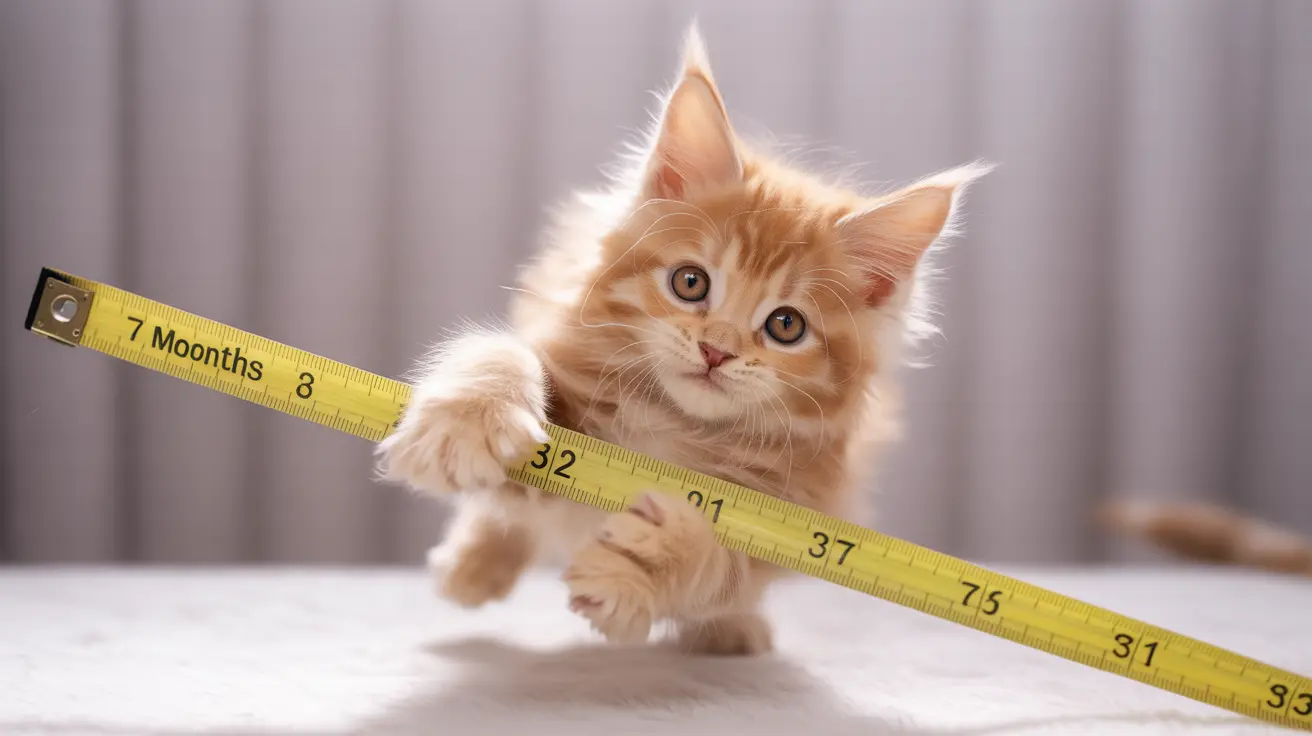Watching your kitten grow into adolescence is an exciting journey, and understanding their development at 7 months old is crucial for ensuring healthy growth. At this stage, your kitten is transitioning from their playful baby phase into a more mature feline, bringing notable changes in size, behavior, and care requirements.
In this comprehensive guide, we'll explore everything you need to know about your 7-month-old kitten's size and development, including expected weight ranges, nutritional needs, and important health considerations.
Understanding Normal Size and Weight at 7 Months
Most 7-month-old kittens typically weigh between 2.5 to 3.5 kg (5.5-7.7 lbs), though this can vary significantly based on breed and gender. Male kittens generally trend larger than females, while breeds like Maine Coons may substantially exceed these averages.
Your kitten's body length should measure approximately 10-12 inches (25-30 cm), not including their tail. By this age, they've typically achieved about 75-80% of their adult size, though larger breeds may continue growing for several more months or even years.
Physical Development Milestones
At 7 months, your kitten has reached several important developmental markers:
- Complete set of adult teeth
- Established eye color
- Advanced physical coordination
- Sexual maturity onset
Their coat will have developed its adult texture and pattern, though seasonal changes in thickness may occur. Most kittens at this age display impressive agility, easily managing complex jumps and maintaining perfect balance.
Nutrition Requirements for Healthy Growth
Proper nutrition is crucial for supporting your kitten's continuing development. They should still be eating specialized kitten food rich in proteins and essential nutrients, typically spread across 2-3 meals daily.
Portion control becomes increasingly important at this age, as the risk of obesity begins to emerge. Monitor your kitten's weight regularly and adjust portions according to their growth rate and activity level.
Behavioral Development and Training
Seven-month-old kittens enter what many consider their "teenage" phase, characterized by:
- High energy levels
- Testing boundaries
- Increased independence
- Strong hunting instincts
This is an ideal time to reinforce positive behaviors and establish lasting training routines. Regular play sessions help channel their energy constructively while strengthening your bond.
Health and Veterinary Care
By 7 months, your kitten should have completed their initial vaccination series. If not already done, discuss spaying or neutering with your veterinarian, as most kittens reach sexual maturity around this age.
Regular health monitoring should include:
- Monthly weight checks
- Dental care routine
- Parasite prevention
- General health observations
Frequently Asked Questions
What is the average weight and size of a 7-month-old kitten?
The average weight ranges from 2.5-3.5 kg (5.5-7.7 lbs), with a body length of 10-12 inches excluding the tail. However, these measurements can vary significantly based on breed and gender.
How much should I feed my 7-month-old kitten to support healthy growth?
Feed your kitten high-quality kitten food 2-3 times daily, following portion guidelines on the package. Adjust amounts based on activity level and growth rate, always ensuring fresh water is available.
When should a 7-month-old kitten complete its vaccination schedule?
Core vaccinations should be completed by 16-20 weeks of age. By 7 months, your kitten should have received all primary vaccines, including FVRCP, rabies, and possibly FeLV, depending on lifestyle risks.
How can I tell if my 7-month-old kitten is growing normally for its breed and gender?
Monitor regular weight gain and compare to breed-specific growth charts. Your kitten should have a visible waist, and you should be able to feel (but not see) their ribs. Consult your vet if concerned about growth rate.
What behavioral changes can I expect from my 7-month-old kitten during adolescence?
Expect increased independence, testing of boundaries, possible territorial marking (especially in unneutered cats), and high energy levels. These behaviors are normal and can be managed through consistent training and environmental enrichment.
Understanding your 7-month-old kitten's growth and development helps ensure they receive appropriate care during this crucial stage. Regular veterinary check-ups, proper nutrition, and plenty of attention will help your kitten develop into a healthy, well-adjusted adult cat.






